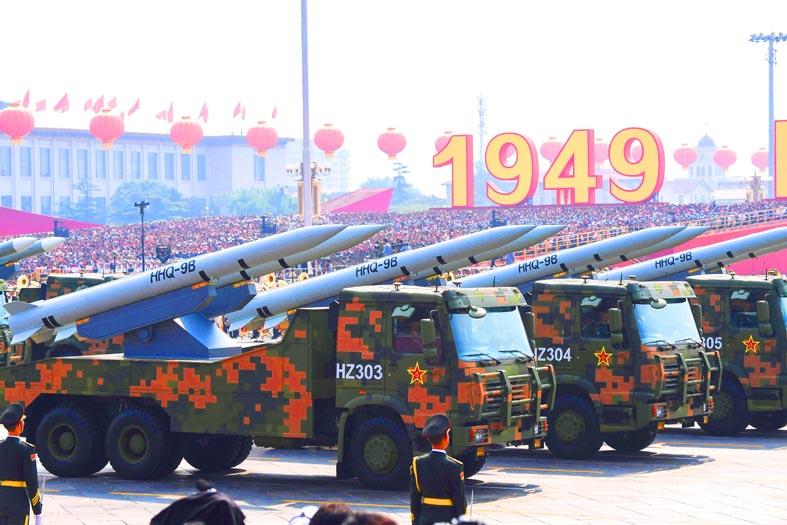US and Chinese companies dominated the global arms market last year, while the Middle East made its first appearance among the 25 biggest weapons manufacturers, a report by the Stockholm International Peace Research Institute (SIPRI) said yesterday.
The US arms industry accounted for 61 percent of sales by the world’s top 25 manufacturers last year, ahead of China’s 15.7 percent, the research institute said.
Total sales by the top 25 rose by 8.5 percent to US$361 billion, or 50 times the annual budget of the UN’s peacekeeping operations.

Photo: AFP
Six US companies and three Chinese firms were in the top 10, rounded out by the UK’s BAE Systems PLC in the seventh spot.
“China and the United States are the two biggest states in terms of global arms spending, with companies cut to size,” Lucie Beraud-Sudreau, director of SIPRI’s arms and military expenditure program, told reporters.
The US has dominated the market for decades, but for China — whose companies’ sales rose by almost 5 percent last year — “this increase corresponds to the implementation of reforms to modernize the People’s Liberation Army under way since 2015,” she said.
US companies Lockheed Martin Corp, Boeing Co, Northrop Grumman Corp, Raytheon Co and General Dynamics Corp clinched the top five spots, while Aviation Industry Corp of China (中國航空工業), China Electronics Technology Corp (中國電子科技) and China North Industries Corp (中國北方工業) held spots six, eight and nine. US group L3Harris Technologies Inc was in 10th place.
“Europe remains a bit dispersed ... but if you combine the European companies together you could have European companies the same size” as US and Chinese manufacturers, Beraud-Sudreau said.
Meanwhile, Airbus SE (European, 13th in the ranking) and Thales Group (French, 14th) can boast of having the strongest international presence — each is represented in 24 countries, ahead of Boeing.
“European companies are more internationalized” than others, Beraud-Sudreau said.
For the first time, a company from the Middle East made it into the top 25: Edge Group, of the United Arab Emirates, was formed by the consolidation of about 25 defense entities last year.
In 22nd spot, Edge “is a good illustration of how the combination of high national demand for military products and services with a desire to become less dependent on foreign suppliers is driving the growth of arms companies in the Middle East,” SIPRI researcher Pieter Wezeman said in the report.
SIPRI also said that French group Dassault Systemes SA had shot up from 38th to 17th place, boosted by exports of its Rafale fighter jets last year.
Two Russian companies were also in the top 25, Almaz-Antey in 15th spot and United Shipbuilding in 25th.
Russian companies were in better shape several years ago thanks to a vast modernization program for the country’s military, but business had since “slowed sharply,” Beraud-Sudreau said.
Sanctions imposed on Moscow after its 2014 annexation of Crimea, and a drop in natural gas and energy prices had affected Russia’s economy, she said.
“Russia has had to slow down its plans to modernize its military equipment... As a result there have been fewer orders from the Russian state, fewer new projects launched and a drop in revenue,” she added.

Merida Industry Co (美利達) has seen signs of recovery in the US and European markets this year, as customers are gradually depleting their inventories, the bicycle maker told shareholders yesterday. Given robust growth in new orders at its Taiwanese factory, coupled with its subsidiaries’ improving performance, Merida said it remains confident about the bicycle market’s prospects and expects steady growth in its core business this year. CAUTION ON CHINA However, the company must handle the Chinese market with great caution, as sales of road bikes there have declined significantly, affecting its revenue and profitability, Merida said in a statement, adding that it would

i Gasoline and diesel prices at fuel stations are this week to rise NT$0.1 per liter, as tensions in the Middle East pushed crude oil prices higher last week, CPC Corp, Taiwan (台灣中油) and Formosa Petrochemical Corp (台塑石化) said yesterday. International crude oil prices last week rose for the third consecutive week due to an escalating conflict between Israel and Iran, as the market is concerned that the situation in the Middle East might affect crude oil supply, CPC and Formosa said in separate statements. Front-month Brent crude oil futures — the international oil benchmark — rose 3.75 percent to settle at US$77.01

RISING: Strong exports, and life insurance companies’ efforts to manage currency risks indicates the NT dollar would eventually pass the 29 level, an expert said The New Taiwan dollar yesterday rallied to its strongest in three years amid inflows to the nation’s stock market and broad-based weakness in the US dollar. Exporter sales of the US currency and a repatriation of funds from local asset managers also played a role, said two traders, who asked not to be identified as they were not authorized to speak publicly. State-owned banks were seen buying the greenback yesterday, but only at a moderate scale, the traders said. The local currency gained 0.77 percent, outperforming almost all of its Asian peers, to close at NT$29.165 per US dollar in Taipei trading yesterday. The

RECORD LOW: Global firms’ increased inventories, tariff disputes not yet impacting Taiwan and new graduates not yet entering the market contributed to the decrease Taiwan’s unemployment rate last month dropped to 3.3 percent, the lowest for the month in 25 years, as strong exports and resilient domestic demand boosted hiring across various sectors, the Directorate-General of Budget, Accounting and Statistics (DGBAS) said yesterday. After seasonal adjustments, the jobless rate eased to 3.34 percent, the best performance in 24 years, suggesting a stable labor market, although a mild increase is expected with the graduation season from this month through August, the statistics agency said. “Potential shocks from tariff disputes between the US and China have yet to affect Taiwan’s job market,” Census Department Deputy Director Tan Wen-ling